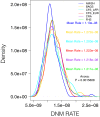De novo mutations across 1,465 diverse genomes reveal mutational insights and reductions in the Amish founder population
- PMID: 31964835
- PMCID: PMC7007577
- DOI: 10.1073/pnas.1902766117
De novo mutations across 1,465 diverse genomes reveal mutational insights and reductions in the Amish founder population
Erratum in
-
Correction for Kessler et al., De novo mutations across 1,465 diverse genomes reveal mutational insights and reductions in the Amish founder population.Proc Natl Acad Sci U S A. 2021 Mar 9;118(10):e2102070118. doi: 10.1073/pnas.2102070118. Proc Natl Acad Sci U S A. 2021. PMID: 33649245 Free PMC article. No abstract available.
Abstract
De novo mutations (DNMs), or mutations that appear in an individual despite not being seen in their parents, are an important source of genetic variation whose impact is relevant to studies of human evolution, genetics, and disease. Utilizing high-coverage whole-genome sequencing data as part of the Trans-Omics for Precision Medicine (TOPMed) Program, we called 93,325 single-nucleotide DNMs across 1,465 trios from an array of diverse human populations, and used them to directly estimate and analyze DNM counts, rates, and spectra. We find a significant positive correlation between local recombination rate and local DNM rate, and that DNM rate explains a substantial portion (8.98 to 34.92%, depending on the model) of the genome-wide variation in population-level genetic variation from 41K unrelated TOPMed samples. Genome-wide heterozygosity does correlate with DNM rate, but only explains <1% of variation. While we are underpowered to see small differences, we do not find significant differences in DNM rate between individuals of European, African, and Latino ancestry, nor across ancestrally distinct segments within admixed individuals. However, we did find significantly fewer DNMs in Amish individuals, even when compared with other Europeans, and even after accounting for parental age and sequencing center. Specifically, we found significant reductions in the number of C→A and T→C mutations in the Amish, which seem to underpin their overall reduction in DNMs. Finally, we calculated near-zero estimates of narrow sense heritability (h2), which suggest that variation in DNM rate is significantly shaped by nonadditive genetic effects and the environment.
Keywords: Amish; de novo mutations; diversity; mutation rate; recombination.
Copyright © 2020 the Author(s). Published by PNAS.
Conflict of interest statement
The authors declare no competing interest.
Figures



References
-
- Reich D. E., et al. , Human genome sequence variation and the influence of gene history, mutation and recombination. Nat. Genet. 32, 135–142 (2002). - PubMed
-
- Ellegren H., Smith N. G., Webster M. T., Mutation rate variation in the mammalian genome. Curr. Opin. Genet. Dev. 13, 562–568 (2003). - PubMed
-
- Kondrashov A. S., Direct estimates of human per nucleotide mutation rates at 20 loci causing Mendelian diseases. Hum. Mutat. 21, 12–27 (2003). - PubMed
Publication types
MeSH terms
Grants and funding
- R35 HG010692/HG/NHGRI NIH HHS/United States
- R01 HL120393/HL/NHLBI NIH HHS/United States
- U24 AG021886/AG/NIA NIH HHS/United States
- HHSN268201500001C/HL/NHLBI NIH HHS/United States
- R01 HL113338/HL/NHLBI NIH HHS/United States
- R01 AI079139/AI/NIAID NIH HHS/United States
- U01 HL137181/HL/NHLBI NIH HHS/United States
- R37 HL066289/HL/NHLBI NIH HHS/United States
- K08 HL141601/HL/NHLBI NIH HHS/United States
- HHSN268201500001I/HL/NHLBI NIH HHS/United States
- R01 HG005701/HG/NHGRI NIH HHS/United States
- T32 CA154274/CA/NCI NIH HHS/United States
- P30 DK020595/DK/NIDDK NIH HHS/United States
- K01 HL135405/HL/NHLBI NIH HHS/United States
- P30 DK040561/DK/NIDDK NIH HHS/United States
- U01 HL137183/HL/NHLBI NIH HHS/United States
- K01 AG059898/AG/NIA NIH HHS/United States
- R01 HL121007/HL/NHLBI NIH HHS/United States
- T32 HL007698/HL/NHLBI NIH HHS/United States
- R01 HL092577/HL/NHLBI NIH HHS/United States
- R01 DK113003/DK/NIDDK NIH HHS/United States
- OT3 OD025459/OD/NIH HHS/United States
- P50 HL118006/HL/NHLBI NIH HHS/United States
- R01 HL066216/HL/NHLBI NIH HHS/United States
- T32 HG000040/HG/NHGRI NIH HHS/United States
- R01 HL138737/HL/NHLBI NIH HHS/United States
- U24 AG056270/AG/NIA NIH HHS/United States
- R01 HL141845/HL/NHLBI NIH HHS/United States
- R01 AR072199/AR/NIAMS NIH HHS/United States
- R35 HL135818/HL/NHLBI NIH HHS/United States
- R01 HL098433/HL/NHLBI NIH HHS/United States
- R01 HL104608/HL/NHLBI NIH HHS/United States
- R01 HL148239/HL/NHLBI NIH HHS/United States
- U01 HL072515/HL/NHLBI NIH HHS/United States
- R01 HL117626/HL/NHLBI NIH HHS/United States
- P20 GM121334/GM/NIGMS NIH HHS/United States
- R01 HL135129/HL/NHLBI NIH HHS/United States
- P01 HL132825/HL/NHLBI NIH HHS/United States
- R01 HL118267/HL/NHLBI NIH HHS/United States
- R01 AG018728/AG/NIA NIH HHS/United States

